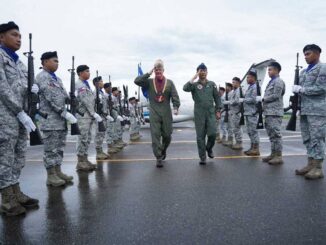
WASHINGTON – U.S. officials met virtually with members of Myanmar’s opposition movement on Friday and pledged to expand direct support to help a transition to civilian government and agreeing on the need to maintain pressure on the military junta, the State Department said.
News of the meeting came after Washington’s regional rival China urged neighboring countries to help war-torn Myanmar advance its peace and reconciliation process when its foreign minister met counterparts from Laos, Myanmar and Thailand.
A U.S. statement said Friday’s meeting involved State Department Counselor Tom Sullivan, USAID Assistant Administrator Michael Schiffer and leading members of Myanmar’s pro-democracy National Unity Government, the National Unity Consultative Council, and key resistance organizations, the Karen National Union, Karenni National Progressive Party, and the Chin National Front.
Myanmar’s state media said on Thursday that China had promised technical support to conduct a census, followed by an election, signaling Beijing’s backing to a junta cornered by an armed rebellion and steadily losing ground.
Myanmar has been in turmoil since 2021 when the military ousted an elected civilian government in a coup, abruptly ending the impoverished country’s tentative steps towards becoming a full-fledged democracy.
In their meeting, Sullivan and the opposition groups the groups agreed on the importance of maintaining pressure on the military regime to change its course,” the U.S. statement said.
The U.S. officials also said Washington would “continue to expand direct support and assistance to pro-democracy actors to help build their cohesion, improve their capability to provide vital public services and humanitarian aid to those in need.”
The two sides pledged to work together with the international community, including special representatives to Myanmar from the United Nations and Association of Southeast Asian Nations to bring an end to the crisis.
Earlier, Chinese foreign minister Wang Yi called the situation in Myanmar “worrying,” and suggested neighboring countries should promote cooperation with Myanmar to help it create economic and social conditions that prevent conflict.
He said China supports a democratic transition in Myanmar and backs a regional plan to find a way out of the ongoing crisis.
(Reporting by David BrunnstromEditing by Alistair Bell)





Be the first to comment